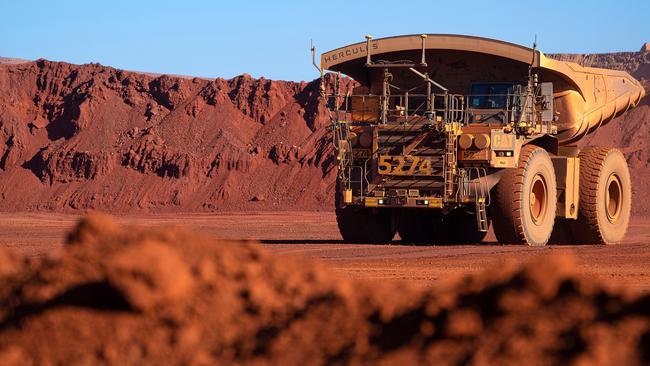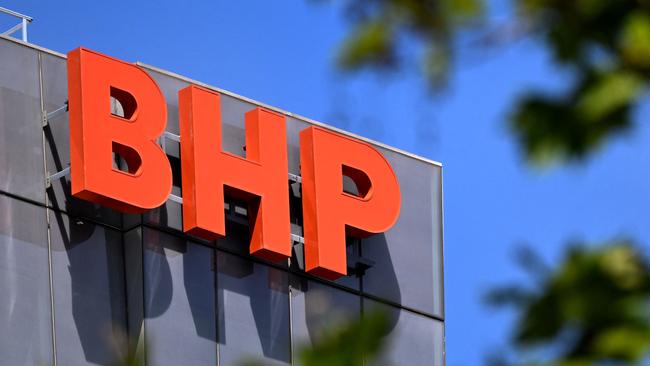BHP calls for growth agenda over higher taxes
BHP says the Albanese government must ‘pursue a growth agenda’ and warning trying to plug the deficit through higher taxes.

Mining giant BHP says the Albanese government in the upcoming budget must “pursue a growth agenda”, warning that trying to plug the deficit through higher taxes would lead to “reduced investment, fewer jobs and, in the long term, lower living standards for Australians”.
With the nation facing a structural annual revenue shortfall over the coming decade of about $50bn amid compounding pressures on spending in areas such as aged care, health care, the NDIS and defence, BHP in its pre-budget submission said it “supports policies that accelerate growth in nominal GDP as the key pillar of Australia’s fiscal consolidation strategy, and seeks certainty that existing fiscal settings for business will remain unchanged”.
Incoming secretary of the CFMEU Zach Smith at the weekend voiced his support for a super-profits tax on mining and energy companies, and Treasury officials are understood to be sympathetic to an idea that has already been implemented in the UK.
BHP sought to pre-empt any such announcement in the May budget, warning “stable, competitive fiscal settings give business confidence to make new investments”. “Sudden changes undermine confidence and ultimately put future investment at risk,” it said.
BHP said the Queensland government’s decision last year to increase royalties on coalminers amid soaring export prices had “damaged investor confidence and prompted businesses to reassess the risk profile of the state”. “Federally, any attempt to address structural pressures on the budget by increasing the tax burden on business will result in a similar outcome – reduced investment, fewer jobs and, in the long term, lower living standards for Australians.”
BHP slammed Labor’s “same job, same pay” reform, saying it would “compound Australia’s existing challenges around productivity and competitiveness”.
The “Same Job, Same Pay” (SJSP) Bill is the second round of Labor’s ambitious workplace reform agenda, after parliament passed multi-employer bargaining legislation in December that allowed for strikes and pay deals across different businesses.
SJSP will change the Fair Work Act so that workers employed through labour hire services would be guaranteed at least the same pay as employees doing the same job and employed directly.
Labor believes that labour contracting is only popular because it allows employers to dud workers by dodging minimum standards and wages set in enterprise bargaining agreements.

“By requiring labour costs in any particular location to be fixed to the highest rate of pay and requiring conditions to apply to labour hire workers based on where they are working, not their own enterprise agreement, SJSP will harm productivity and directly contradicts the government’s stated aim to encourage more enterprise bargaining,” BHP said in its submission. “SJSP will also jeopardise Australia’s international competitiveness by removing flexibility and increasing costs without corresponding increases to labour productivity.”
BHP, which employs 50,000 people across the country, said that the mining sector paid the highest average annual wage of $144,000, versus $95,000 across all industries. The mining giant predicted that demand for the nation’s key exports over the long-term, including for coal, iron ore and gas, would “come under increasing pressure as a result of global megatrends, including decarbonisation”.
But BHP said “the global energy transition provides opportunities for Australia to create new sources of national prosperity”.
“Demand will significantly increase for commodities needed for electrification and decarbonisation, like copper, nickel, lithium, cobalt, uranium, graphite and rare earth elements.”
BHP urged the government to move more quickly to improve our attractiveness to global investors, warning that other countries similarly blessed with such natural endowments were stealing the march on Australia.
“We’ve seen examples in the US with the Inflation Reduction Act and in Canada with their Critical Minerals Strategy, which recognise the importance of critical minerals and the need to incentivise investment.”








To join the conversation, please log in. Don't have an account? Register
Join the conversation, you are commenting as Logout